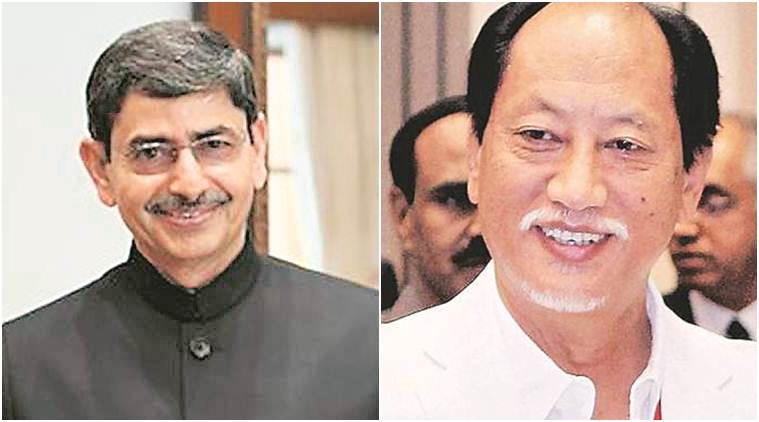 Governor R N Ravi and Chief Minister Neiphiu Rio. (File)
Governor R N Ravi and Chief Minister Neiphiu Rio. (File)
While Nagaland Governor R N Ravi’s letter to Chief Minister Neiphiu Rio, in which he expressed his concern over the deteriorating law and order situation in the state, has surprised many, officials familiar with the matters said it was “bound to happen, given developments in the state”.
Ravi, in his June 16 letter, had given his detailed assessment of the law and order situation in the state to Rio’s Nationalist Democratic Progressive Party (NDPP)-led coalition government. The BJP is a key ally in the government.
Ravi’s letter stated that he would exercise his power as Governor, provided under Article 371 (A) of the Constitution, since the government has failed miserably in a sensitive border-state, sources said.
With the letter, the Governor has taken full charge of the important law and order decisions, including transfer and posting of officials.
According to an official, Governors had used powers under the Article until 2013, but when Ashwani Kumar took over (in March 2013), he did not interfere much into the administrative affairs.
“But Governor Ravi has been hands-on with the state’s affairs,” the official said.
Ravi has been the interlocutor for the Centre to finalise the Naga accord with the National Socialist Council of Nagaland (NSCN) to end the insurgency in the state.
Article 166 Clause 3 also gives powers to the Governor to allocate business of government among the ministers.
There have been serious concerns over law and order situation in the state for the Union government too, it is learnt. Officials pointed out that there have been a number of incidents of extortion by organised armed gangs – as mentioned by Ravi in his letter – in the last one year, including one with a family close to a senior politician at the national level, who had to face the gangs while they were on visit to the state.
In his letter, Ravi wrote: “…I can no longer abstain from my Constitutional obligations for law and order in the state under Article 371 A (1) (b) of the Constitution of India. I hereby propose that hereafter important law and order decisions like transfer and posting of official entrusted with maintenance of law and order responsibilities of and above the district level will be after the approval of the Governor.”
He also proposed periodical review of law and order situation in the state and issue required lawful directions, as well as reviewing of the Annual Performance Appraisal Reports of officers involved in the law and order process.
Clause 1b in Article 371(A), which deals with special powers given to Nagaland, provides immense powers to the Governor. It says: “The Governor of Nagaland shall have special responsibility with respect to law and order…for so long as in his opinion internal disturbances occurring in Naga Hills-Tuensang Area immediately before the formation of that State continue therein or in any part thereof…” In discharge of his functions, it states, “the Governor shall, after consulting the Council of Ministers, exercise his individual judgment as to the action to be taken”.